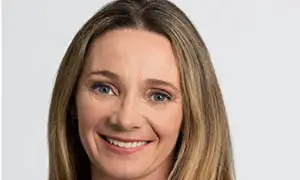MBNU chapter education day: Using health data and ensuring privacy
On October 18, 2022, the CHIMA (Manitoba and Nunavut) MBNU chapter hosted a chapter education day. After years of virtual communication and meetings, this event presented an opportunity for members and other attendees to network and gain insights from leaders in health care and beyond.
Susan Anderson (CHIMA board director and chief information officer at the Nunavut Ministry of Health) and Courtney Sabo, CHIM, TFL (program coordinator and instructor, RRC Polytechnic) began the day. They introduced the first speaker—Chief Medical Officer, Winnipeg Regional Health Authority, Dr. Joss Reimer, MD, MPH, FRCPC.
Dr. Reimer’s presentation discussed the value of data-informed decisions and vaccine distribution challenges in Manitoba. She spoke of the fears associated with rapid vaccine production, the role misinformation played in vaccine acceptance, and the logistics issues affecting the delivery of and access to vaccines.
She noted the importance of data on priority communities. Through data, they discovered that low-income communities had lesser vaccination rates and that eligibility and safe spaces were crucial to improving vaccination rates among non-white communities. As she and her team responded to the data, these communities were better served. “When we actually serve people, health outcomes change,” Dr. Reimer said.

As the world continues to emerge out of the COVID-19 pandemic, the significance of health data and health information professionals increases. However, Canada’s health care systems are burdened by resignations and burnout, and decision-makers are often unaware of the importance of health information. They don’t recognize the stories health data tell about the quality of care, social determinants of health, and the impact of technology on health care delivery across the country.
Addressing this, Brenda Catchpole, BA, MHA, shared seven strategies to ensure that health information professionals’ works are seen, understood, and acted upon.
Catchpole believes data-informed decisions are successful and defensible and that health information professionals have a unique perspective and the necessary information to improve efficiency in Canada’s health care system.
“It’s all hands on deck, and I think that includes you,” Catchpole said, stressing the need for health information professionals to be content experts, to be visible allies of the health care system, to be proactive with data, to find powerful allies who echo pressing issues, to communicate complex information effectively, to develop a thick skin against opposition, and to be prepared to counter concerns about their data.

The conversation on data concerns is growing as more data breaches occur with serious consequences. It was the subject of the panel session for the day and was moderated by Laura Krawec, CHIM (MBNU and Saskatchewan community facilitator).
During the session, Lee Bassett, CHIM, (privacy and access specialist, Southern Health – Santé Sud), Valerie Gural, CCHRA(C), (privacy manager, Shared Health), and Christina Von Schindler, BA, MPA, (chief privacy officer, Shared Health) discussed best practices in privacy management and confidentiality.
It was noted that convenience and risk go hand-in-hand with technological interventions. However, Bassett urged attendees to “know the functionality of HIM products,” use smart passwords, avoid recording work meetings and using personal devices for work, and refrain from divulging health information on social media.
Despite these best practices, organizations are still at risk of hackers, malicious software, and ignorance resulting in unethical practices.
When faced with ethical dilemmas (professional or organizational actions opposing one’s ethical codes), Bassett advised attendees to engage colleagues respectfully. She also clarified that health information professionals should only access health information for work purposes. “We require it to do our roles,” she said.
To counter misconceptions about health data and access, Bassett recommended CHIMA’s professional development offerings and community sessions, which provide learnings on ethical standards and codes. This was echoed by Gural, who believes that “education is the best mitigation we can do.”

As part of the lessons learned from breaches, Gural shared that her team conducts regular privacy audits to reveal system loopholes. Reiterating this, Von Schindler encouraged all to know their obligations and to “leave your work knowledge in your work hat, and that will keep you from breaches.”
In the last session of the day, Micheal Harding detailed his journey to optimal mental health and a commitment to public service. Attendees learned of his three-year quest through the jungles of the Peruvian Amazon to find wholeness from childhood trauma and mental illness.


The day was also marked by a networking session planned and coordinated by HIM students of RRC Polytechnic.
CEO Jeff Nesbitt and Laura Krawec ended the day with closing remarks and prizes for attendees.
CHIMA would like to appreciate the following for the success of this event.
Photographer:
- Vanessa Le, CHIM | Coding Technologist, Heath Sciences Centre Winnipeg
MBNU chapter volunteers:
- Laura Krawec, CHIM | Data Integrity Analyst, Shared Health-Soins Communs | Community Facilitator, MBNU Chapter, CHIMA
- Jennifer McNish, CHIM | Manager (Interim), Digital Imaging Service Team – Digital Health, Shared Health
- Kristin Krahn, CHIM | Privacy Officer & Manager, Health Information Services, Grace Hospital and Victoria Hospital
- Tasha Prychitko, CHIM | Clinical Research Professional, Ethics and Regulatory Affairs, CancerCare Manitoba
- Courtney Sabo, CHIM | Program Coordinator & Instructor, RRC Polytechnic | Educational Pathway Coordinator, CHIMA
Event sponsors:









